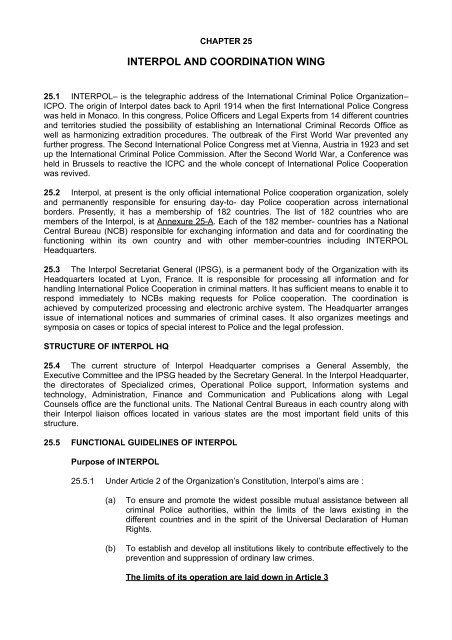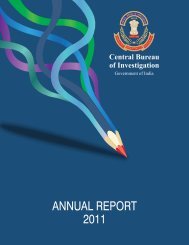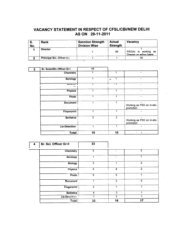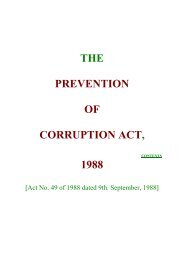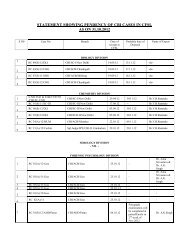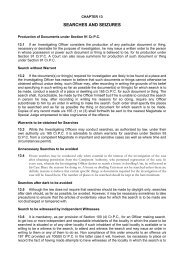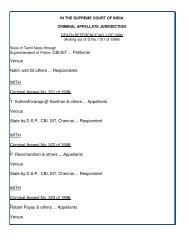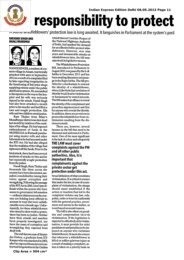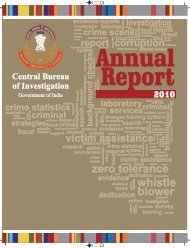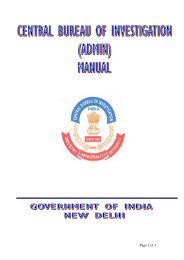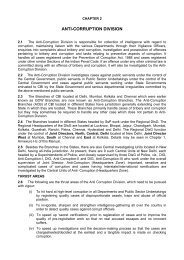Interpol and Coordination Wing - Central Bureau of Investigation
Interpol and Coordination Wing - Central Bureau of Investigation
Interpol and Coordination Wing - Central Bureau of Investigation
You also want an ePaper? Increase the reach of your titles
YUMPU automatically turns print PDFs into web optimized ePapers that Google loves.
CHAPTER 25INTERPOL AND COORDINATION WING25.1 INTERPOL– is the telegraphic address <strong>of</strong> the International Criminal Police Organization–ICPO. The origin <strong>of</strong> <strong>Interpol</strong> dates back to April 1914 when the first International Police Congresswas held in Monaco. In this congress, Police Officers <strong>and</strong> Legal Experts from 14 different countries<strong>and</strong> territories studied the possibility <strong>of</strong> establishing an International Criminal Records Office aswell as harmonizing extradition procedures. The outbreak <strong>of</strong> the First World War prevented anyfurther progress. The Second International Police Congress met at Vienna, Austria in 1923 <strong>and</strong> setup the International Criminal Police Commission. After the Second World War, a Conference washeld in Brussels to reactive the ICPC <strong>and</strong> the whole concept <strong>of</strong> International Police Cooperationwas revived.25.2 <strong>Interpol</strong>, at present is the only <strong>of</strong>ficial international Police cooperation organization, solely<strong>and</strong> permanently responsible for ensuring day-to- day Police cooperation across internationalborders. Presently, it has a membership <strong>of</strong> 182 countries. The list <strong>of</strong> 182 countries who aremembers <strong>of</strong> the <strong>Interpol</strong>, is at Annexure 25-A. Each <strong>of</strong> the 182 member- countries has a National<strong>Central</strong> <strong>Bureau</strong> (NCB) responsible for exchanging information <strong>and</strong> data <strong>and</strong> for coordinating thefunctioning within its own country <strong>and</strong> with other member-countries including INTERPOLHeadquarters.25.3 The <strong>Interpol</strong> Secretariat General (IPSG), is a permanent body <strong>of</strong> the Organization with itsHeadquarters located at Lyon, France. It is responsible for processing all information <strong>and</strong> forh<strong>and</strong>ling International Police Cooperation in criminal matters. It has sufficient means to enable it torespond immediately to NCBs making requests for Police cooperation. The coordination isachieved by computerized processing <strong>and</strong> electronic archive system. The Headquarter arrangesissue <strong>of</strong> international notices <strong>and</strong> summaries <strong>of</strong> criminal cases. It also organizes meetings <strong>and</strong>symposia on cases or topics <strong>of</strong> special interest to Police <strong>and</strong> the legal pr<strong>of</strong>ession.STRUCTURE OF INTERPOL HQ25.4 The current structure <strong>of</strong> <strong>Interpol</strong> Headquarter comprises a General Assembly, theExecutive Committee <strong>and</strong> the IPSG headed by the Secretary General. In the <strong>Interpol</strong> Headquarter,the directorates <strong>of</strong> Specialized crimes, Operational Police support, Information systems <strong>and</strong>technology, Administration, Finance <strong>and</strong> Communication <strong>and</strong> Publications along with LegalCounsels <strong>of</strong>fice are the functional units. The National <strong>Central</strong> <strong>Bureau</strong>s in each country along withtheir <strong>Interpol</strong> liaison <strong>of</strong>fices located in various states are the most important field units <strong>of</strong> thisstructure.25.5 FUNCTIONAL GUIDELINES OF INTERPOLPurpose <strong>of</strong> INTERPOL25.5.1 Under Article 2 <strong>of</strong> the Organization’s Constitution, <strong>Interpol</strong>’s aims are :(a)(b)To ensure <strong>and</strong> promote the widest possible mutual assistance between allcriminal Police authorities, within the limits <strong>of</strong> the laws existing in thedifferent countries <strong>and</strong> in the spirit <strong>of</strong> the Universal Declaration <strong>of</strong> HumanRights.To establish <strong>and</strong> develop all institutions likely to contribute effectively to theprevention <strong>and</strong> suppression <strong>of</strong> ordinary law crimes.The limits <strong>of</strong> its operation are laid down in Article 3
25.5.2 It is strictly forbidden for the Organization to undertake any intervention oractivities <strong>of</strong> a political, military, religious or racial character.25.5.3 According to the interpretation given to Article 3, a political <strong>of</strong>fence is one which isconsidered to be <strong>of</strong> a predominantly political nature because <strong>of</strong> the surroundingcircumstances <strong>and</strong> underlying motives, even if the <strong>of</strong>fence itself is covered by theordinary Criminal Law in the country in which it was committed. Thisinterpretation, based on the predominant aspect <strong>of</strong> the <strong>of</strong>fence, is embodied in aResolution adopted by <strong>Interpol</strong>’s General Assembly in 1951.25.5.4 In addition, a Resolution adopted in 1984 states that, in general, <strong>of</strong>fences are notconsidered to be political when they are committed outside a “conflict area” <strong>and</strong>when the victims are not connected with the aims or objectives pursued by the<strong>of</strong>fenders.Cooperation Principles25.5.5 International Police Cooperation with the ICPO-INTERPOL has always beenconducted in accordance with the guiding principles listed below:(a)(b)(c)Respect for national sovereignty: Cooperation is based in the actions takenby the Police forces in the various Member-States. They operate <strong>and</strong>cooperate within their own national boundaries in accordance with their ownnational laws.Enforcement <strong>of</strong> ordinary criminal law: The Organization’s field <strong>of</strong> activities islimited to crime prevention <strong>and</strong> law enforcement in connection with ordinarycriminal <strong>of</strong>fences. This is the only basis on which there can be agreementbetween all Member- States.Universality: Any Member- State may cooperate with any other <strong>and</strong>cooperation must not be impeded by geographical or linguistic factors.(d) Equality <strong>of</strong> all Member-States: All the Member-States are provided withthe same services <strong>and</strong> have the same rights, irrespective <strong>of</strong> the size <strong>of</strong> theirfinancial contributions to the Organization.(e)(f)Cooperation with other agencies: Cooperation is extended through theNational <strong>Central</strong> <strong>Bureau</strong>s to any Government agency concerned withcombating ordinary criminal <strong>of</strong>fences.Flexibility <strong>of</strong> working methods: Although governed by principles designed toensure regularity <strong>and</strong> continuity, working methods are flexible enough totake account <strong>of</strong> the wide variety <strong>of</strong> structures <strong>and</strong> situations in differentcountries.25.5.6 Respect for these principles means that <strong>Interpol</strong> cannot have teams <strong>of</strong> detectiveswith supranational powers who travel around investigating cases in differentcountries. International Police cooperation has to depend on coordinated actionon the part <strong>of</strong> the Member-States’ Police forces, all <strong>of</strong> which may supply orrequest information or services on different occasions.25.6 NATIONAL CENTRAL BUREAU (NCB)-NEW DELHI:25.6.1 <strong>Interpol</strong> New Delhi is the sole authorized agency in India for contacts with thePolice agencies <strong>of</strong> other countries. It functions as a Branch <strong>of</strong> CBI <strong>and</strong> is underthe control <strong>of</strong> a Deputy Director (DIG Rank) assisted by two Assistant DirectorsPage 2 <strong>of</strong> 5
(<strong>Interpol</strong>) <strong>of</strong> the rank <strong>of</strong> Superintendents <strong>of</strong> Police. <strong>Interpol</strong> <strong>Wing</strong> h<strong>and</strong>les variousmatters like Extradition; Letters Rogatory; Preliminary Enquiries; <strong>Investigation</strong> incriminal cases; Inquiries in non-crime-related matters; Issuance <strong>of</strong> <strong>Interpol</strong>Notices; Verification <strong>of</strong> character <strong>and</strong> antecedents; Verification <strong>of</strong> telephonenumbers, Passport details, Driving licenses; Drugs <strong>and</strong> counterfeit currencies;<strong>Coordination</strong> <strong>and</strong> Conferences; Negotiation <strong>of</strong> treaties <strong>of</strong> extradition <strong>and</strong> MutualLegal Assistance in criminal matters etc.25.6.2 For the purpose <strong>of</strong> effective discharge <strong>of</strong> its duties, the <strong>Interpol</strong> <strong>Wing</strong> <strong>of</strong> CBI isfunctionally divided into the various desks, such as: <strong>Investigation</strong>s abroad,<strong>Investigation</strong>s in India; Red Corner Notices; General enquiries, Extradition, Drugs<strong>and</strong> counterfeit currencies; Conferences, Protocol; Treaty negotiations <strong>and</strong> legalissues etc. Further restructuring <strong>and</strong> strengthening <strong>of</strong> <strong>Interpol</strong> <strong>Wing</strong> is underconsideration.25.6.3 <strong>Interpol</strong>-New Delhi has recently been uplinked to IPSG through the <strong>Interpol</strong>Global Communication System 24/7, which has replaced the old X-400 system.The new system is capable <strong>of</strong> transmitting images, graphic files, audio, videoattachments.25.6.4 All the States/UT Police Forces <strong>and</strong> Commissionerates <strong>of</strong> Police have designated<strong>Interpol</strong> Liaison Offices who are in direct communication with <strong>Interpol</strong> <strong>Wing</strong> (CBI)through CBI Comm<strong>and</strong> Centre to facilitate expeditious exchange <strong>of</strong> information<strong>and</strong> extend cooperation.COORDINATION WING25.7 The <strong>Coordination</strong> <strong>Wing</strong> is a non- investigating Unit <strong>of</strong> CBI dealing with the generalcoordination <strong>and</strong> administrative matters, including Establishment, Accounts, Accommodationrelating to <strong>Interpol</strong> <strong>and</strong> <strong>Coordination</strong> functions <strong>of</strong> CBI. It is headed by a Deputy Director (DIG), whois assisted by an Assistant Director (SP) <strong>and</strong> other executive, technical ministerial <strong>and</strong> specializedstaff deployed at the <strong>Interpol</strong>, Comm<strong>and</strong> Centre <strong>and</strong> <strong>Coordination</strong> <strong>Wing</strong>.25.8 The primary duty <strong>of</strong> <strong>Coordination</strong> <strong>Wing</strong> is to liaise <strong>and</strong> coordinate with Branches <strong>of</strong> CBI <strong>and</strong>other Departments/ Ministries, Law Enforcement Agencies, State/UT Police Forces <strong>and</strong> foreignPolice/Missions <strong>and</strong> organizations as <strong>and</strong> when required. The following are the main areas whichare being looked after by the <strong>Coordination</strong> <strong>Wing</strong> <strong>of</strong> CBI:LOOK OUT CIRCULARS (LOC)25.9 The Look Out Circulars are opened to trace the absconding criminals <strong>and</strong> also to prevent<strong>and</strong> monitor effectively the entry or exit <strong>of</strong> persons who may be required by law enforcementauthorities.25.9.1 The basic substantive guidelines regarding the publication <strong>of</strong> the LOCs in relationto Indian citizens issued by the MHA enunciate the following four cardinalprinciples:25.9.2 The request for opening <strong>of</strong> LOC is required to be made to all immigration Checkpostsin the country in the Official Format prescribed by the MHA.25.9.3 The request for opening <strong>of</strong> LOC must invariably be issued with the approval <strong>of</strong> anOfficer not below the rank <strong>of</strong> Deputy Secretary to the Government <strong>of</strong> India/JointSecretary in the State Government/ Superintendent <strong>of</strong> Police concerned at thedistrict level.25.9.4 The originating agency must ensure that complete identifying personal particulars<strong>of</strong> the person, in respect <strong>of</strong> whom the LOC is to be opened, are clearly mentionedin the prescribed pr<strong>of</strong>orma. The LOC will not be opened for less than threeidentity parameters other than name <strong>of</strong> the subject.Page 3 <strong>of</strong> 5
25.9.5 An LOC is valid for a period <strong>of</strong> one year. However, in case the originating agencywants to extend the validity beyond one year it can ask for the extension beforethe expiry <strong>of</strong> the one year period. If no request is made for the extension <strong>of</strong> theLOC within the stipulated period <strong>of</strong> one year, the Immigration Officer concerned isauthorized to suspend the LOC.Nomination <strong>of</strong> Designated Officer25.10 The Government <strong>of</strong> India has introduced the Passport (Amendment) Ordinance, 2001Section 10-A which provides for issuing <strong>of</strong> notice for suspension/ revocation <strong>of</strong> passport by theDesignated Officer. The Director/CBI has nominated the Dy Director (<strong>Coordination</strong>), CBI toexercise powers conferred by this amendment. The provision implies that it is imperative tonominate a Designated Officer by the respective State Government/<strong>Central</strong> Agencies to follow,enforce <strong>and</strong> execute the procedures envisaged in the Ordinance. It is however, reiterated that thepowers so conferred by this Ordinance are only to be executed to cover those cases which fallunder the purview <strong>of</strong> Section 10(3)(c) <strong>of</strong> the Passports Act, 1967. The Designated Officer will havethe discretion to further delegate the powers to lower level functionaries to facilitate action totemporarily suspend a passport at the ground level, after obtaining the formal express approvalfrom the Designated Officers as per the laid-down procedure.Biennial Conference <strong>of</strong> CBI, Heads <strong>of</strong> ACBx <strong>and</strong> others25.11 One <strong>of</strong> the functions <strong>of</strong> the <strong>Coordination</strong> <strong>Wing</strong> is to conduct the Biennial Joint Conference <strong>of</strong>CBI in which apart from the CBI <strong>of</strong>ficials, the Heads <strong>of</strong> State Anti-Corruption <strong>Bureau</strong>x, CVOs <strong>and</strong>others participate. This is a prestigious All India Conference organized every 2 years.DsGP/IsGP Conference25.12 The DsGP/IsGP Conference is organized by Intelligence <strong>Bureau</strong> every year. Some <strong>of</strong> therecommendations <strong>of</strong> this Conference are communicated to CBI for necessary follow-up action <strong>and</strong>implementation. This work is carried out by the <strong>Coordination</strong> <strong>Wing</strong>.D.P. Kohli Memorial Lecture25.13 The DP Kohli Memorial Lecture is organized every year in April to celebrate the FoundationDay <strong>of</strong> CBI.25.14 The <strong>Coordination</strong> <strong>Wing</strong> is also responsible to organize other conferences on the subjects <strong>of</strong>pr<strong>of</strong>essional interest to the CBI.25.15 The <strong>Coordination</strong> <strong>Wing</strong> also keeps data on Anti-Corruption, Vigilance <strong>and</strong> other subjectsentrusted to it for purposes <strong>of</strong> coordination. It is the Unit responsible for undertaking coordination<strong>and</strong> cooperation between various organizations, agencies, Departments <strong>and</strong> national/internationalbodies, on behalf <strong>of</strong> CBI.Publication <strong>of</strong> CBI Bulletin25.16 The <strong>Coordination</strong> <strong>Wing</strong> publishes a monthly journal entitled CBI Bulletin, which has a widecirculation in India <strong>and</strong> abroad.Fugitive <strong>Investigation</strong> Support Unit (FISU)25.17 This Unit has been established in the <strong>Coordination</strong> <strong>Wing</strong> to facilitate <strong>and</strong> monitorinvestigation support in tracking Proclaimed Offenders, absconders <strong>and</strong> Fugitives wanted by theCBI, <strong>Interpol</strong> <strong>and</strong> other Law Enforcement Agencies.______Page 4 <strong>of</strong> 5
ANNEXURE 25-AINTERPOL MEMBER- COUNTRIES (182)A Afghanistan|Albania | Algeria | Andorra | Angola | Antigua & Barbuda | Argentina | Armenia | Aruba |Australia | Austria | AzerbaijanBCDEFGHIJKLBahamas | Bahrain | Bangladesh | Barbados | Belarus | Belgium | Belize | Benin | Bolivia | Bosnia-Herzegovina | Botswana | Brazil | Brunei | Bulgaria | Burkina-Faso | BurundiCambodia | Cameroon | Canada | Cape Verde | <strong>Central</strong> African Republic | Chad | Chile | China|Colombia | Comoros | Congo | Congo (Democratic Rep.) | Costa Rica | Côte d'Ivoire | Croatia | Cuba |Cyprus | Czech RepublicDenmark | Djibouti | Dominica | Dominican RepublicEast Timor | Ecuador | Egypt | El Salvador | Equatorial Guinea | Eritrea | Estonia | EthiopiaFiji | Finl<strong>and</strong> | Former Yugoslav Republic <strong>of</strong> Macedonia | FranceGabon | Gambia | Georgia | Germany | Ghana | Greece | Grenada | Guatemala | Guinea | GuineaBissau | GuyanaHaiti | Honduras | HungaryIcel<strong>and</strong> | India | Indonesia | Iran | Iraq | Irel<strong>and</strong> | Israel | ItalyJamaica | Japan | JordanKazakhstan | Kenya | Korea (Rep. <strong>of</strong>) | Kuwait | KyrgyzstanLaos | Latvia | Lebanon | Lesotho | Liberia | Libya | Liechtenstein | Lithuania | LuxembourgM Madagascar | Malawi | Malaysia | Maldives | Mali | Malta | Marshall Isl<strong>and</strong>s | Mauritania|Mauritius|Mexico| Moldova | Monaco | Mongolia | Morocco | Mozambique| MyanmarN Namibia | Nauru | Nepal | Netherl<strong>and</strong>s | Netherl<strong>and</strong>s Antilles | New Zeal<strong>and</strong> | Nicaragua | Niger |Nigeria | NorwayOPQRSTUVYOmanPakistan | Panama | Papua New Guinea | Paraguay | Peru | Philippines | Pol<strong>and</strong> | PortugalQatarRomania | Russia | Rw<strong>and</strong>aSt. Kitts <strong>and</strong> Nevis | St. Lucia | St. Vincent <strong>and</strong> the Grenadines | Sao Tome <strong>and</strong> Principe | SaudiArabia | Senegal | Serbia <strong>and</strong> Montenegro | Seychelles | Sierra Leone | Singapore | Slovakia |Slovenia | Somalia | South Africa | Spain | Sri Lanka | Sudan | Suriname | Swazil<strong>and</strong> | Sweden |Switzerl<strong>and</strong> | SyriaTajikistan | Tanzania | Thail<strong>and</strong> | Togo | Tonga | Trinidad & Tobago | Tunisia | TurkeyUg<strong>and</strong>a | Ukraine | United Arab Emirates | United Kingdom | United States | Uruguay | UzbekistanVenezuela | VietnamYemenZZambia | Zimbabwe_______Page 5 <strong>of</strong> 5


